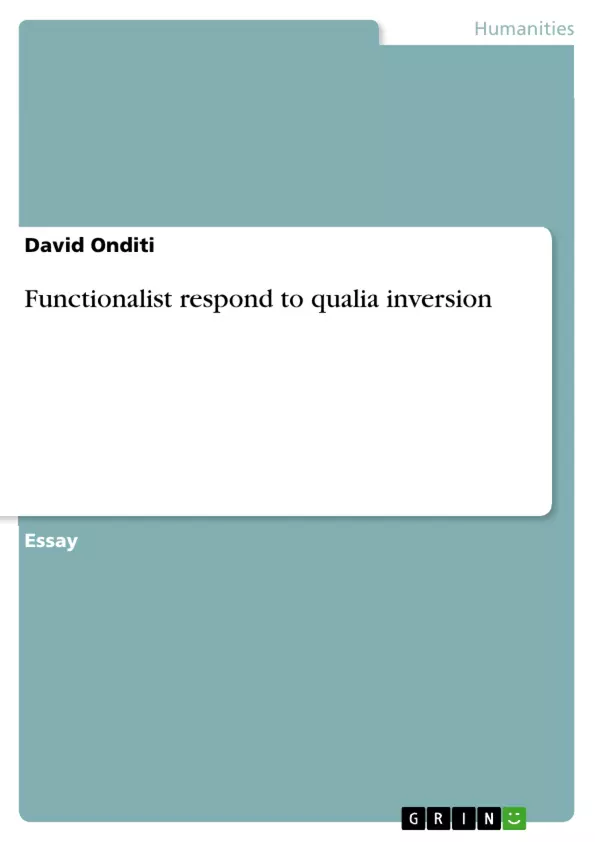Functionalists agree that when an inverted spectrum occurs and the normal function of the sensory sense is not restored, then their main prediction can be refuted. Functionalists contend that inverted spectrum can happen, but the behavioral accommodation helps to revert it to the normal function. The use of the expression “he sees red where other…” works under the normal expression that the meaning that the functionalists give to red is the same to that of others and that there is an agreement on the naming of the colors. Thus, in any instance where the person sees red when all other people would say that they saw green, we would say that that particular person is different from us. The functionalists will look for the cause of the difference in the judgment of the individual with the inverted qualia. If a reason for the difference is found, there will be a greater level of inclination towards saying that the person saw red where others saw green.
Inhaltsverzeichnis (Table of Contents)
- Introduction
- The Inverted Spectrum Hypothesis
- Counterarguments to Functionalism
- Conclusion
Zielsetzung und Themenschwerpunkte (Objectives and Key Themes)
This paper examines the inverted spectrum hypothesis and its implications for functionalism. It explores the argument that a person could have an inverted spectrum, where they experience colors differently from others, while still functioning normally. The paper investigates whether this scenario refutes functionalism and analyzes the counterarguments presented by functionalists.
- The nature of qualia and their role in mental states
- The implications of the inverted spectrum hypothesis for functionalism
- The arguments presented by functionalists to defend their position
- The possibility of behavioral accommodation in cases of qualia inversion
- The limitations of functionalist theories in accounting for subjective experience
Zusammenfassung der Kapitel (Chapter Summaries)
- Introduction: This section introduces the concept of functionalism and its core prediction that sensory input undergoes systematic transformations followed by behavioral accommodation. The paper raises the question of whether the possibility of acquiring an inverted spectrum, where colors are experienced differently, disproves functionalism.
- The Inverted Spectrum Hypothesis: This section delves into the inverted spectrum problem, arguing that a person could have an inverted spectrum without realizing it. It examines how functionalists respond to this challenge, emphasizing the role of behavioral accommodation in restoring normal function.
- Counterarguments to Functionalism: This section explores counterarguments against functionalism. It discusses the argument that inverted spectrum could be a possible scenario where the non-inverted and inverted individuals are functionally the same. The section also touches upon the issue of behaviorally undetected inversions and the limitations of functionalist theories.
Schlüsselwörter (Keywords)
This paper focuses on the central concepts of qualia, functionalism, inverted spectrum, behavioral accommodation, and counterarguments. It examines the implications of the inverted spectrum hypothesis for functionalist theories and explores the possibility of a person experiencing colors differently without a change in their overall functioning.
Frequently Asked Questions
What is the "inverted spectrum hypothesis"?
It is the idea that two people could have different internal color experiences (qualia) while behaving identically and using the same color names.
How do functionalists respond to the problem of qualia inversion?
Functionalists argue that even if an inversion occurs, behavioral accommodation helps restore the system to its normal functional state.
Does qualia inversion refute functionalism?
Functionalists agree that if the normal function is not restored, their prediction is refuted, but they look for behavioral differences to explain the inversion.
What is "behavioral accommodation"?
It refers to the process where an individual adapts their behavior to match societal norms and naming conventions, even if their internal experience differs.
Why is the naming of colors important for functionalists?
Functionalism relies on the agreement of naming (e.g., calling red "red") to define the functional role of a mental state.
What are the limitations of functionalist theories regarding qualia?
Critics argue that functionalism fails to fully account for the subjective, "what it's like" aspect of experience (qualia) that may not be captured by behavior alone.
- Quote paper
- David Onditi (Author), 2017, Functionalist respond to qualia inversion, Munich, GRIN Verlag, https://www.grin.com/document/434686



